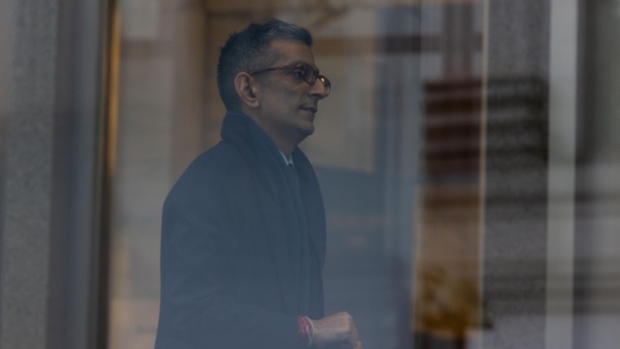Feb 7, 2024
Citadel Among Hedge Funds That Got Morgan Stanley’s Block-Trading Leaks
, Bloomberg News

(Bloomberg) -- When the US punished Morgan Stanley for leaking upcoming stock trades to favored clients, it kept the list of recipients secret. They include one of Wall Street’s biggest players: Citadel.
A trader at Ken Griffin’s giant hedge fund was among a coterie of executives described anonymously in Morgan Stanley’s settlements with the government, according to people with knowledge of the matter.
Beyond Citadel, recipients of stock tips described in legal documents — without being named — include people at block-trading specialist CaaS Capital Management, Segantii Capital Management and Evolution Capital Management, the people said, asking not to be identified describing confidential aspects of the probe.
Prosecutors haven’t accused any buy-side participants that allegedly received tips of any wrongdoing.
The probe faulted Morgan Stanley for giving hedge funds advance warning as clients planned to sell slugs of stock big enough to move market prices. The Justice Department and the Securities and Exchange Commission said bank employees doled out the information, with the expectation that hedge funds would short the stocks and position themselves to buy parts of a block once it hit the market.
The identity of the firms involved shows how far information traveled as Morgan Stanley bankers breached client confidentiality to bolster its franchise. While the bank’s close work with some specialist firms has previously been explored, Citadel’s ties to the case were less known.
Not every leak resulted in hedge fund managers trading before blocks of stock were sold. In some cases the sellers aborted their plans, which is what happened on two trades that were leaked to Citadel. Industry lawyers also argued that if firms did trade, they didn’t break any laws, because they hadn’t signed confidentiality pacts with the bank.
Hedge funds on the receiving end of information from a Morgan Stanley executive were “entitled to assume he was following his firm’s rules,” said Cristie Ford, a former Davis Polk lawyer who now teaches at the University of British Columbia. The nature of interactions is such that “some of it is based on rumors, some of it is based on hunches, and some of it is based on hypothetical questions from equity desks.”
“For people in the industry, there’s a feeling you can skate as close to the line as possible,” she said. “From an outsider’s position the whole thing feels uncomfortable.”
Morgan Stanley paid a $249 million penalty to end the probe. Pawan Passi, who ran the bank’s US equity syndicate desk when he was put on leave in 2021, was barred from the industry for a year by the SEC.
Representatives for the bank and hedge funds declined to comment or didn’t respond to messages.
‘Fishy’ Performance
Sellers offloading blocks of stock have long vented frustrations about prices that slip just before a trade is executed, reducing their proceeds. Morgan Stanley, a force in block trading, was a target of scorn among envious rivals, who dubbed price declines before its sales “the Morgan Stanley fade.”
One proposed trade was leaked to two hedge funds including Citadel, but the seller grew suspicious as the market price began sliding, writing to the head of Morgan Stanley’s desk that the “stock performance smells fishy,” according to the Justice Department. The customer ultimately halted plans to offload stock that month. Citadel had not shorted that stock — radio station operator iHeartMedia Inc. — before the proposed trade unraveled, two people said.
In another example, Morgan Stanley’s banker told the Citadel trader about discussions with a potential block seller. Citadel’s trader then provided a thorough description of his existing short position in the stock and received assurances that when the sale proceeded, he would get an allocation large enough to cover his bearish bet and close out the trade. That sale also fell through, one of the people said.
The Citadel trader left the firm last year. His departure wasn’t tied to the investigation, two of the people said.
With Frank Fu’s CaaS Capital, the government identified instances where the firm shorted shares after conversations with Morgan Stanley.
One of the stocks was Star Bulk Carriers Corp., an Athens-based shipping company that the founder of CaaS had never traded before, according to the bank’s deal with prosecutors, which didn’t name that firm either. Morgan Stanley allocated 2 million shares from a 10.6 million-share offering to help CaaS close out a short position and make money off the trade, the settlement document says.
The block sales allegedly linked to Hong Kong-based Segantii and Nevada-based Evolution were tied to a London-based executive who initially worked at Segantii and then moved to Evolution. The employee subsequently had a falling out with Evolution over pay. Evolution later wrote in a court document that the trader was being scrutinized in the government’s probe. No charges were ever levied against him or the firms.
Tipping Funds
The block-trading probe exposed a type of leak that has long been suspected on Wall Street. It was widely known that banks engaged in delicate conversations with hedge funds to gauge their potential interest in slugs of stocks that could become available. The question was whether those conversations effectively tipped off hedge funds.
Some see it as a bad look for markets, even if it’s deemed legal. “There should probably be more clear rules about what the process should be,” according to Eric Rosen, a former senior JPMorgan Chase & Co. trader who also ran a hedge fund.
“A judge once described porn as ‘I know it when I see it,’” he said. “If you are tipped off about a huge block that’s coming out and you start shorting it and then you are buying it back, it doesn’t smell right to me. That just doesn’t seem like a level playing field.”
--With assistance from Ava Benny-Morrison and Bei Hu.
(Updates with related news section and location of hedge funds after 15th paragraph.)
©2024 Bloomberg L.P.





